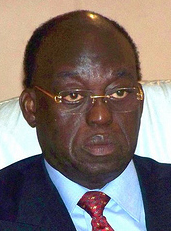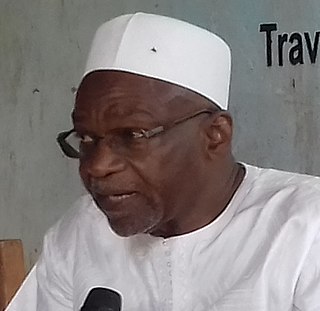
The politics of Gabon takes place in a framework of a republic whereby the president of Gabon is head of state and in effect, also the head of government, since he appoints the prime minister and his cabinet. The government is divided into three branches: the executive headed by the prime minister, the legislative that is formed by the two chambers of parliament, and the judicial branch. The judicial branch is technically independent and equal to the two other branches, although in practice, since its judges are appointed by the president, it is beholden to the same president. Since independence the party system is dominated by the conservative Gabonese Democratic Party.

The politics of Kenya take place in a framework of a presidential representative democratic republic, whereby the president is both head of state and head of government, and of a multi-party system in accordance with a new constitution passed in 2010.

The politics of Seychelles have historical roots in both one-party socialism and autocratic rule. Following independence from the United Kingdom in 1976, Seychelles was a sovereign republic until 1977, when the original President and leader of the Seychelles Democratic Party, James Mancham, was overthrown in a bloodless coup by the Prime Minister France-Albert René. René installed a single-party socialist state under the Seychelles People's Progressive Front in 1979 which remained in power until 1993, when multiparty elections took place for the first time since independence, after restoring the multi-party system in 1991. Modern day Seychelles governance takes place in a framework of a presidential republic, whereby the President of Seychelles is both head of state and head of government, and of a multi-party system. Executive power is exercised by the government. Legislative power is vested in both the government and the National Assembly.
The politics of Tanzania takes place in a framework of a unitary presidential democratic republic, whereby the President of Tanzania is both head of state and head of government, and of a multi-party system. Executive power is exercised by the government. Legislative power is vested in both the government and parliament. The party system is dominated by the Chama Cha Mapinduzi. The Judiciary is independent of the executive and the legislature.

The Politics of Azerbaijan takes places an authoritarian system where elections are not free and fair, political opponents are repressed, civil rights are limited, human rights abuses are widespread, corruption is rampant, and power is concentrated in the hands of President Ilham Aliyev and his extended family.

The president of South Africa is the head of state and head of government of the Republic of South Africa. The president directs the executive branch of the government and is the commander-in-chief of the South African National Defence Force. Between 1961 and 1994, the office of head of state was the state presidency.

Julius Kambarage Nyerere was a Tanzanian anti-colonial activist, politician and political theorist. He governed Tanganyika as prime minister from 1961 to 1962 and then as president from 1962 to 1964, after which he led its successor state, Tanzania, as president from 1964 to 1985. He was a founding member and chair of the Tanganyika African National Union (TANU) party, and of its successor Chama Cha Mapinduzi, from 1954 to 1990. Ideologically an African nationalist and African socialist, he promoted a political philosophy known as Ujamaa.

Macky Sall is a Senegalese politician who has served as the President of Senegal since April 2012. He was re-elected President in the first round voting in February 2019. Under President Abdoulaye Wade, Sall was Prime Minister of Senegal from July 2004 to June 2007 and President of the National Assembly from June 2007 to November 2008.

Moustapha Niasse is a Senegalese politician and diplomat who has been President of the National Assembly from 2012 until 2022. He served in the government of Senegal as Foreign Minister of Senegal from 1978 to 1984 and again from 1993 to 1998. He was Prime Minister of Senegal for a few weeks in 1983, and he held that position again from 2000 to 2001.

Saleh Kebzabo is a Chadian politician. He is the President of the National Union for Democracy and Renewal (UNDR) and a Deputy in the National Assembly of Chad. He was designated Prime Minister by president Mahamat Déby on 12 October 2022.
The United Social Democratic Party is a centre-left social democratic political party in Guinea-Bissau.

Edward Ngoyai Lowassa is a Tanzanian politician who was Prime Minister of Tanzania from 2005 to 2008, serving under President Jakaya Kikwete. Lowassa has gone into record as the first Prime Minister to have been forced to resign by a fraud scandal in the history of Tanzania. Following his resignation President Kikwete was obliged to dissolve his cabinet as required by the Constitution and with minimum delay, constituted a new one under a new Prime Minister, Mizengo Pinda.
Edward Moringe Sokoine was a Tanzanian politician who served two terms as Prime Minister of Tanzania, from 13 February 1977 to 7 November 1980 and again from 24 February 1983 to 12 April 1984.

The Politics of Serbia are defined by a unitary parliamentary framework that is defined by the Constitution of Serbia in which the president, currently Aleksandar Vučić, is the head of state while the prime minister, currently Ana Brnabić, is the head of government. Executive power is exercised by the Serbian government and the President of Serbia. Legislative power is vested in the unicameral National Assembly which is composed of 250 proportionally elected deputies. The judiciary is independent and is headed by the Supreme Court of Cassation, which is also the highest court in Serbia.

The prime minister of Zimbabwe was a political office in the government of Zimbabwe that existed on two occasions. The first person to hold the position was Robert Mugabe from 1980 to 1987 following independence from the United Kingdom. He took office when Southern Rhodesia became the Republic of Zimbabwe on 18 April 1980. This position was abolished when the constitution was amended in 1987 and Mugabe became president of Zimbabwe, replacing Canaan Banana as the head of state while also remaining the head of government. The office of prime minister was restored in 2009 and held by Morgan Tsvangirai until the position was again abolished by the 2013 Constitution of Zimbabwe.
General elections were held for the first time in the newly formed Union of Tanzania in September 1965. The country had also just become a one-party state, with the Tanganyika African National Union as the sole legal party on the mainland, and the Afro-Shirazi Party was the only party in Zanzibar. For the National Assembly election there were two candidates from the same party in each constituency, whilst the presidential election was effectively a referendum on TANU leader Julius Nyerere's candidacy.
General elections were held in Tanzania on 26 October 1975. The country was a one-party state at the time, with the Tanganyika African National Union as the sole legal party on the mainland, and the Afro-Shirazi Party was the only party in Zanzibar. For the National Assembly election there were two candidates from the same party in each of the constituencies, whilst the presidential election was effectively a referendum on TANU leader Julius Nyerere's candidacy.
General elections were held in Tanzania on 26 October 1980. The country was a one-party state at the time, with the Chama Cha Mapinduzi as the sole legal party, following the 1977 merger of the mainland-based Tanganyika African National Union and the Zanzibar-based Afro-Shirazi Party, which had previously operated as the sole legal parties in their areas. For the National Assembly election there were two candidates from the same party in each of the 106 constituencies, whilst the presidential election was effectively a referendum on CCM leader Julius Nyerere's candidacy.
General elections were held in Tanzania on 27 October 1985. The country was a one-party state at the time, with the Chama Cha Mapinduzi as the sole legal party. For the National Assembly election there were two candidates from the same party in each constituency, whilst the presidential election was effectively a referendum on CCM's candidate Ali Hassan Mwinyi, who succeeded Julius Nyerere as president.

Lucy Lameck was a Tanzanian politician, who was the first woman to hold a Ministerial post in the government. Born to a farming family, she trained as a nurse before becoming involved in politics and attending Ruskin College, Oxford, through a scholarship. She first entered the Tanganyika National Assembly in 1960, before being elected to the Tanzania National Assembly in 1965. With the exception of 1975 to 1980, she continued to hold a seat there until her death in 1993. She is seen as a role model, having worked throughout her life to improve conditions within the country for women.














